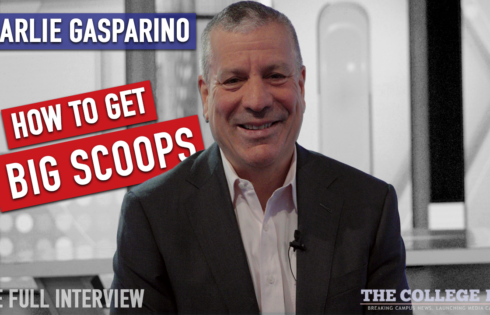
Anything can qualify as ‘hostile’ under UO’s reasoning
The University of Oregon is running headlong into decades of legal precedent that says public institutions can’t punish employees for their perceived offensive speech.
Law professors around the country are frowning upon the university’s finding that one of their peers, School of Law Prof. Nancy Shurtz, committed “discriminatory harassment” by dressing as a black male scientist at her Halloween party, to which she had invited her students.
Shurtz and her attorney are looking into “legal options” following the university’s release of its investigative report, which she said violated her employee privacy rights, according to a statement given to the media last week:
In addition, the report contains numerous mistakes, errors and omissions that if corrected would have put matters in a different light. For example, it ignored the anonymous grading process, the presence of many non-students as guests, and the deceptive emails that created a firestorm in the law school.
I, and my legal advisers, were preparing a response to the draft report. Although the University was aware of our intention to submit our corrections by noon (local time) yesterday and to deal with its errors in-house, the Provost’s office or its advisers cynically decided to try to publicly shame me instead.
Though some of Shurtz’s colleagues in the law school joined the chorus asking her to resign, prominent legal scholars think she has a good case against UO.
George Washington University’s Jonathan Turley says two federal appeals courts (including the 9th Circuit, which governs Oregon) have expressly slapped down punishments by public institutions for conduct that is arguably worse than Shurtz’s clumsy attempt to highlight racial disparities in higher education.
One involved a fraternity that used blackface in an “ugly woman” skit; another, a police officer that wore blackface in public for “entertainment”; and the 9th Circuit case, the most recent (2010), which involved a community college professor who sent “three racially-charged emails” around the district.
Turley said an open question is “what the standard is for faculty in conducting or expressing themselves” if they aren’t protected by the First Amendment, but he thinks she has a “strong basis” to sue.
UCLA Law Prof. Eugene Volokh wrote a lengthy entry in The Washington Post arguing that UO had effectively yanked back “free speech for professors on subjects such as race, religion, sexual orientation”:
[A]ccording to the university’s logic, a faculty member could be disciplined for displaying the Mohammed cartoons, if it caused enough of a furor. Or a faculty member could be disciplined for suggesting that homosexuality may be immoral or dangerous. Or for stating that biological males who view themselves as female should be viewed as men, not as women. Or for suggesting that there are, on average, biological differences in temperament or talents between men and women.
All such speech at the University of Oregon will risk your being suspended or perhaps even worse. Orthodoxy, enforced on threat of institutional punishment, is what the University of Oregon is now about.
The university is not simply limiting its rationale for punishing Shurtz to the black makeup she wore, Volokh says. It is telling students and faculty that if they complain loudly enough, UO will punish the speaker – a classic heckler’s veto.
MORE: ‘Discriminatory harassment’ if you provoke debate around campus
Take the Mohammed cartoon hypothetical:
Then some Muslim students, both ones who are at the event and those who just hear about it, get upset. His colleagues and the administration decide to discuss the matter in detail, which fans the flames — something that could happen with the cartoons as easily as it can with Shurtz’s makeup. Under the logic of the Oregon report, such a post would equally be punishable “harassment.”
Volokh thinks the fact that Shurtz invited her students to the party is no different than a professor inviting students to read her blog:
Indeed, reading a professor’s blog is likely to be more helpful to a student’s grade than coming to the professor’s party, because it can give the student a better perspective on the professor’s thinking on various topics that might come up in class …
And the report begins by saying that “harassment” is “disruptive” and thus punishable, “regardless of the relative power of the harasser” (emphasis added). So even if professors avoid inviting students to their parties, or studiously limit anything they may wear, display in their homes or say at their parties in order to avoid offense to students, the university’s logic would punish (and thus suppress) speech far outside such supposedly coercive social occasions.
Volokh points to a 3rd Circuit opinion concerning a school district, written by future Supreme Court Justice Samuel Alito, that said there’s no “harassment exception” to the First Amendment. And yet UO believes that “even isolated statements are punishable” as “harassment,” Volokh says:
Here, after all, there was one professor wearing one costume. Yet because that led other people to criticize (or defend) the costume, the professor’s one-time speech was labeled “harassment” and treated as being punishable.
South Texas College of Law Prof. Josh Blackman said that when the Federalist Society chapter at UO Law invited him to speak on intellectual diversity at a post-election event, no law professors were willing to participate – a bad sign.
He calls UO’s justification for punishing Shurtz “a very, very dangerous standard”:
An off-campus event that a small number of students attended now gives rise to on-campus discipline because students (who did not even witness the event) feel compelled to “avoid the resulting negative environment.” If this is the standard, then anything and everything can create a “hostile educational environment.”
UO is basically inviting students to file harassment complaints in response to their professors’ remarks at “bar association events” if they disagree with the content of the remarks – such as a defense of the controversial “mismatch theory” of affirmative action, Blackman says (he has a forthcoming law review article related to this).
He describes the on-campus mood at UO from his post-election appearance there:
One student told me that he attempted to defend Prof. Shurtz’s First Amendment rights on Facebook, and he was savagely attacked by other students, who charged that he was racist. Another student said that certain professors were dedicating class time to the issue (which upset some students), and other professors were not dedicating class time to the issue (which upset other students). Another mentioned the “fear of retribution” among students on the right. Another said that only one professor on campus offered a tepid response of Shurtz, and this professor was lambasted by colleagues. All noted that there was a tension in the air, and a distinct fear of defending Professor Shurtz’s rights.
In a second post, Blackman analyzes how the 4th Circuit’s ruling in favor of the cop in blackface is related to the situation at UO.
That court said the “perceived threat of disruption” was caused by the reaction to the cop’s performance from “offended segments of the public.” Blackman says:
Professor Shurtz’s costume did not cause any sort of disruption, but the punishment was justified by the “threatened reaction” to her costume “by offended segments of the public.” At bottom, the dispute arose only because of the so-called hecklers-veto.
Blackman also has deeper insights into the other federal appeals court decisions that run counter to the UO’s reasoning. For another exhaustive analysis of why UO is a ripe litigation target, see attorney Hans Bader’s post.
The Foundation for Individual Rights in Education’s Susan Kruth has the prime takeaway for members of the UO community:
Students and professors are in trouble if they are at risk for punishment any time their expression motivates rigorous debate on campus. UO’s actions and the report on this incident make clear that that risk is real, and this could play out in any number of disturbing ways. For instance, public discussion of significant current events might well dominate classroom discussions and social media. The outcome in Shurtz’s case means that if someone expresses their opinion on any race- or sex-related controversy in a way that others deem offensive, that person will be held responsible for all subsequent discomfort and disruption—even if that discomfort is a natural consequence of constitutionally protected speech, and even if the disruption is plainly someone else’s responsibility.
Like The College Fix on Facebook / Follow us on Twitter
IMAGE: ostill/Shutterstock






Please join the conversation about our stories on Facebook, Twitter, Instagram, Reddit, MeWe, Rumble, Gab, Minds and Gettr.